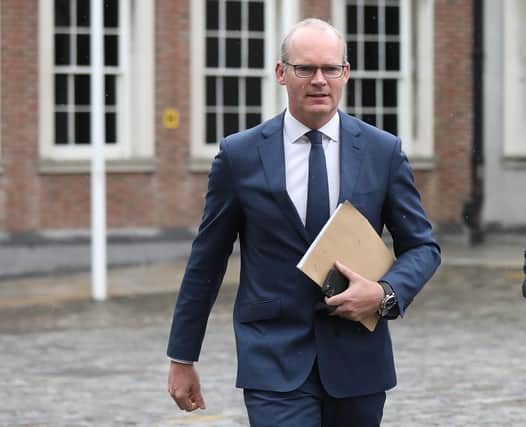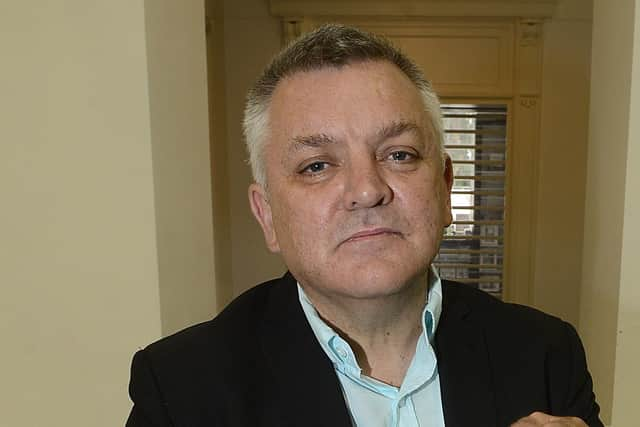Henry McDonald: Journalists should shun this Dublin-funded study into how the media uses language


Whether it is the Radio Ulster programme, or the BBC 1 television brand fronted up by the big man himself this writer has rarely made an appearance. In fact, the only time I came close to taking part in the TV version of ‘the biggest show in the country’ was when I was asked to present a short film in which I was to advocate legalising drugs at least a decade and a half ago.
The idea was dropped at the 11th hour and I never got the chance to use ‘Nolan’ to challenge the irrational policy of drug prohibition.
Advertisement
Hide AdAdvertisement
Hide AdNo matter. Such is the career you choose where you can be flavour of the month for a short period of time and then deemed an irrelevant voice thereafter. Yet to borrow and mangle a phrase from Voltaire – I may not like who Nolan invites onto his show (instead of me!) but I defend his right to do so.


The insidious and politically agenda driven attacks on Nolan since early last summer have to be opposed by anyone who believes in free speech.
‘Nolan’ is clearly the big target when it comes of critics who claim the show plays a divisive role in Northern Ireland. An online petition is still in circulation which claims that at least 13,000 people have called for the programme to be cancelled. The BBC in response correctly describes the campaign against ‘Nolan’ as a bid to “smear and censor its journalism”.
Local Beeb bosses to their total credit have robustly defended the presenter and his production team against the attacks, which interestingly began only after ‘Nolan’ exposed some uncomfortable truths about the Bobby Storey funeral last year.
Now it seems we journalists might soon be “all Nolan now”.
Advertisement
Hide AdAdvertisement
Hide AdA new research project has been established based in Derry, which seeks to investigate the role of the media in Northern Ireland.
In the tender for the project document it states its mission, “to review and assess the impact of the use of language by Northern Ireland-based media, and the positive/negative contribution that this makes to addressing division and deepening understanding of the constitutional issue”.
I find it telling that the tender also refers to an organisation called “the Future Relationship Conversations team”, which talks about Brexit and the possibility of a border poll being more likely.
This suggests to me that those behind the project are nationalists and that it is they who are somewhat upset about the uncomfortable topics and issues ‘The Nolan Show’ and perhaps others in journalism might cover locally.
Advertisement
Hide AdAdvertisement
Hide AdIt find it equally revealing that Irish Foreign Minister Simon Coveney’s department is co-funding the ‘research’ into the Northern Ireland media. It is deeply troubling that a state, any state let alone one at present which is regarded as increasingly hostile by a majority of unionists, should be sponsoring a project that many believe is designed to shut down debate, censor reporting and dictate media agendas.
State involvement alone should prompt every single journalist in this society to refuse to co-operate with this project. Moreover, it is the duty of the Society of Editors across the UK and Ireland alongside the National Union of Journalists and civil libertarians to also give this project the cold shoulder.
We have of course been here before back in the 1990s. Remember that sinister phrase ‘Journalists Against The Peace Process” or “JAPPS.” The “JAPPS” happened to be those reporters who after the IRA and loyalist ceasefires of 1994 were unwilling to turn a blind eye to clear breaches of the paramilitary cessations of violence.
Many including this writer were briefed against in the darker corners of the Northern Ireland Office and the Department of Foreign Affairs. Attempts were made to censor individual reporters.
Advertisement
Hide AdAdvertisement
Hide AdThe underlying innuendo of this briefing was to paint journalists simply doing their jobs by asking awkward questions as war junkies who wanted conflict to continue even though all of us had as first hand witnesses often to the violence have been scarred in some way by what we saw and reported.
In the case of the award-winning journalist/author Ed Moloney, Sinn Fein’s leadership including Martin McGuinness toured the newsrooms of London trying to smear him and his critically acclaimed book, ‘A Secret History of the IRA’.
Journalism locally and nationally is already bound by legal and ethical constrictions. The British and Irish libel laws are among the most iniquitous in the democratic world and are loaded in favour of the litigious rich. BBC journalism is governed by a Bible thick set of rules known as the “producers’ guidelines” whilst every newspaper in the land has to answer to the IPSOS media watchdog.
An academic study of media is one thing, an attempt to portray the press and broadcasters are sectarian pot stirrers is quite another.
Advertisement
Hide AdAdvertisement
Hide AdAnyone interested in media freedom and scrutiny of the powerful in politics, business or public life should oppose this Coveney-funded concept.
• Ben Lowry Sep 11: We remember the September 11 attacks because they were meant to terrorise us, and did
• Ruth Dudley Edwards Sep 7: The emphasis of care for the elderly should be on leaving people their independence
• Owen Polley Sep 4: Unionism needs leaders who set the agenda
Advertisement
Hide AdAdvertisement
Hide Ad• Other article by Henry McDonald below, beneath that information on how to subscribe:
• Henry McDonald Sep 6: The cross border policing pursuit plan has not been thought through
• Henry McDonald Aug 28: INLA’s biggest propaganda coup since Wright murder
• Henry McDonald Aug 23: Irish nationalists can’t rely on Biden, as Kabul shows
——— ———
A message from the Editor:
Advertisement
Hide AdAdvertisement
Hide AdThank you for reading this story on our website. While I have your attention, I also have an important request to make of you.
With the coronavirus lockdown having a major impact on many of our advertisers — and consequently the revenue we receive — we are more reliant than ever on you taking out a digital subscription.
Subscribe to newsletter.co.uk and enjoy unlimited access to the best Northern Ireland and UK news and information online and on our app. With a digital subscription, you can read more than 5 articles, see fewer ads, enjoy faster load times, and get access to exclusive newsletters and content. Visit https://www.newsletter.co.uk/subscriptions now to sign up.
Our journalism costs money and we rely on advertising, print and digital revenues to help to support them. By supporting us, we are able to support you in providing trusted, fact-checked content for this website.
Ben Lowry
Acting Editor